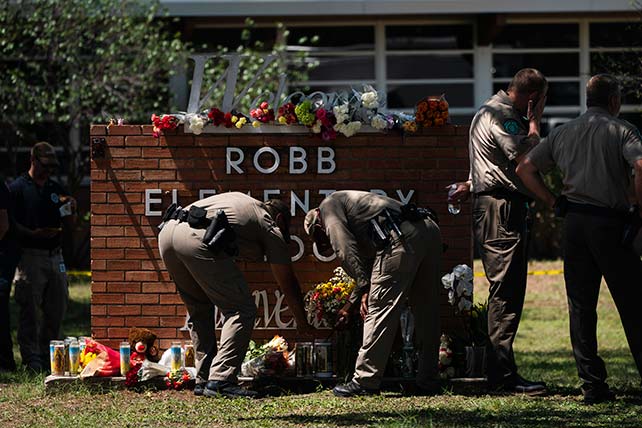How long, Lord, must I call for help, but you do not listen? Or cry out to you, “Violence!” but you do not save?
This prayer of Habakkuk is one we must pray in the horrific aftermath of Uvalde, Texas. I’m the father of five young children, including our son Justin. He is the same age as the students in the 4th-grade classroom at Robb Elementary, where the shooter barricaded himself and committed pure evil.
Before Justin left for school this morning, I held him and audibly prayed over him and didn’t want to let him go. And now I ask, how can we pray when we cannot find the words? How can we comfort when pure evil leaves us paralyzed, numb and questioning? How can we live by faith in God’s promises when what we would prefer is an explanation? How can we find peace when we will never be the same?
Here are three immediate steps forward, wobbly as they may appear at first.
We all pray too religiously. God is big enough to handle our laments, complaints, and questions.
Are you dead, God? This is how Habakkuk opens his prayer to God (Habakkuk 1:1-11). Pray as the Old Testament prophet Habakkuk prayed: Are you really who you say you are God? (Habakkuk 1:12-2:20). Pour out your heart to God in prayer for the families of Uvalde, and use raw words. Our religious clichés will not be of help. Bumper sticker theology or fortune cookie comments? Vacuous. We need the raw presence of God, and His presence will be present through your prayers.
Habakkuk’s interaction with God reminds us that the life of faith often involves lament, complaint, and the pouring out of one’s honest emotions and feelings to God. Remember, often our prayers are aches and groans because we do not know what to say. Saint Paul wrote, “The Spirit helps us in our weakness. For we do not know what to pray for as we ought but the Spirit himself intercedes for us with groanings too deep for words.” Our burdens are so great, and we cannot find the words to pray, so we rely on the Spirit and groan in prayer for the families of Uvalde. As a parent, I will pray for the families of Uvalde with our five children, but I will not pray too religiously.
Look to the “who” when we do not understand the “why.”
Uvalde leaves us tremendously confused and badly shaken, but we must know where to turn, and we need to schedule an audience with the Lord to discuss our plight. Our faith amid tragedy must dare God to be God. There are 2,461 verses in the 150 chapters of the Psalms. One out of every three Psalms is a cry of lament. Hundreds of times in the Psalms, we’re taught to look to God when everywhere else look confused. This is our ray of hope when God seems hidden.

